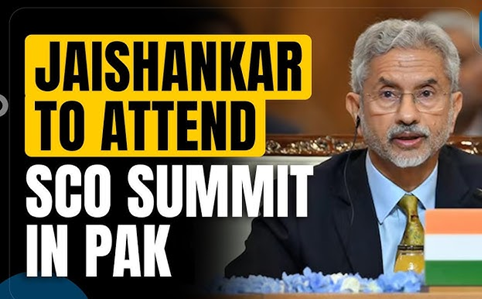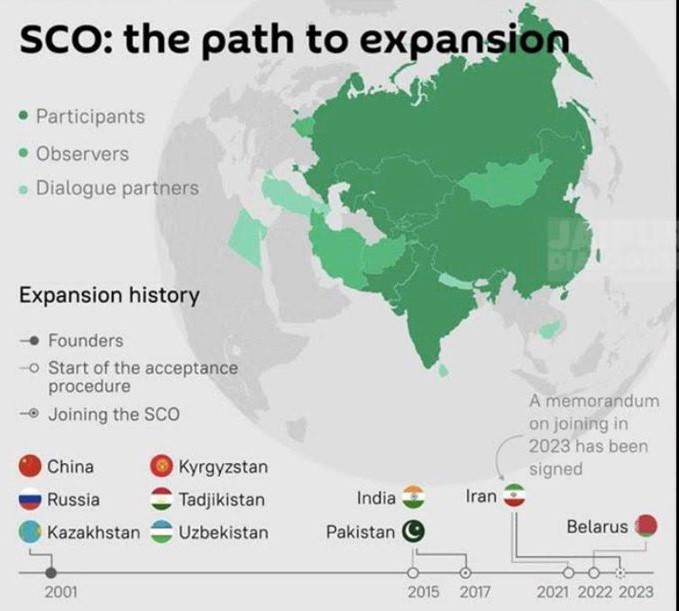- Courses
- GS Full Course 1 Year
- GS Full Course 2 Year
- GS Full Course 3 Year
- GS Full Course Till Selection
- Answer Alpha: Mains 2025 Mentorship
- MEP (Mains Enrichment Programme) Data, Facts
- Essay Target – 150+ Marks
- Online Program
- GS Recorded Course
- Polity
- Geography
- Economy
- Ancient, Medieval and Art & Culture AMAC
- Modern India, Post Independence & World History
- Environment
- Governance
- Science & Technology
- International Relations and Internal Security
- Disaster Management
- Ethics
- NCERT Current Affairs
- Indian Society and Social Issue
- NCERT- Science and Technology
- NCERT - Geography
- NCERT - Ancient History
- NCERT- World History
- NCERT Modern History
- CSAT
- 5 LAYERED ARJUNA Mentorship
- Public Administration Optional
- ABOUT US
- OUR TOPPERS
- TEST SERIES
- FREE STUDY MATERIAL
- VIDEOS
- CONTACT US
S Jaishankar To Represent India at SCO Summit In Pakistan
S Jaishankar To Represent India at SCO Summit In Pakistan

External Affairs Minister S. Jaishankar is set to visit Islamabad, Pakistan, on October 15-16 to attend the Shanghai Cooperation Organisation (SCO) ‘Heads of Government’ meeting. Pakistan had extended an invitation to India and Prime Minister Narendra Modi earlier this year in August.
What is the Shanghai Cooperation Organisation (SCO)?

- The SCO originated from the Shanghai Five, established in 1996, comprising China, Russia, Kazakhstan, Kyrgyzstan, and Tajikistan.
- The formation aimed to address growing concerns about extremist religious groups and ethnic tensions in Central Asia following the dissolution of the USSR in 1991.
The SCO was formalized on June 15, 2001, in Shanghai, incorporating Uzbekistan as the sixth member. As of now, the organization includes:
- Full Members: India, Iran, Kazakhstan, China, Kyrgyzstan, Pakistan, Russia, Tajikistan, Uzbekistan
- Observer Status: Afghanistan and Mongolia
India’s Role in SCO:
- India was given an observer status to SCO in 2005.
- India has gained full membership at the Asthana Summit of 2017 along with Pakistan.
- Since its inception as a full member, India has supported strengthening the core agenda of SCO on terrorism and radicalism and reinforced commitment to regional connectivity, stability, territorial integrity and sovereignty.
Significance of the SCO:
The SCO is one of the few international organizations focused on security issues with a primarily Asian membership. Here are key points regarding its significance:
1. Alternative to Western Influence:
The SCO is viewed by Russia and China as a counterbalance to Western dominance in international relations. Alongside BRICS, it is part of their broader strategy to diminish US influence in global affairs.
2. Competition Between Russia and China:
- While Russia and China maintain a façade of camaraderie, there is inherent competition for influence within the SCO, particularly concerning Central Asia.
- China’s investment in infrastructure projects, linked to its Belt and Road Initiative (BRI), positions it as a significant player in the region, historically viewed as Russia’s sphere of influence.
3. Inclusion of India and Pakistan:
- The entry of India and Pakistan in 2017 highlighted this geopolitical tug-of-war.
- Russia supported India’s membership, while China backed Pakistan to maintain a balance of power.
4. Broader Geopolitical Context:
- The expansion of the SCO also reflects the changing geopolitical landscape, particularly in light of deteriorating relations between the US, Russia, and China.
- The inclusion of Iran is perceived as a move to enhance the SCO’s global stature and to support Iran in breaking free from US diplomatic isolation.
5. Limited Tangible Outcomes:
- Despite its grand ambitions, the SCO has been criticized for lacking effective mechanisms to resolve member-state rivalries.
- The organization allows countries to superficially engage while often avoiding addressing their underlying conflicts, particularly between India and Pakistan.
Relevance of the SCO for India:
The SCO serves several purposes for India:
1. Enhanced Cooperation with Central Asia:
Membership in the SCO provides India a platform to engage with Central Asian countries, which have historically had limited relations with India since their independence in 1991. This engagement is crucial for regional stability and security.
2. Counter-Terrorism Cooperation:
A key component of the SCO is the Regional Anti-Terrorist Structure (RATS), which facilitates counter-terrorism exercises, intelligence sharing, and collaborative efforts against drug trafficking and terrorism.
3. Managing Difficult Relationships:
India's participation allows it to maintain communication with significant regional players. However, the effectiveness of this engagement is challenged by tense relations with both China and Pakistan.
Challenges Ahead:
Given the current geopolitical landscape, India's relationships with China and Pakistan remain fraught with tension. Notably, India opted for a virtual summit during its presidency last year, indicating the challenges in managing inter-member dynamics within the SCO.
Conclusion:
S. Jaishankar's upcoming visit to Pakistan for the SCO meeting underscores the organization's importance in regional security and geopolitics. While the SCO offers a platform for dialogue and cooperation, the complexities of member-state relations, especially between India, Pakistan, and China, pose significant challenges that may limit the organization's effectiveness.
Must Check: Best IAS Coaching In Delhi
UPSC Prelims Result 2024 Out: Expected Cut Off & Other Details, UPSC Prelims 2024 Answer with Explanation, Daily Prelims Quiz, Daily Current Affairs, MONTHLY CURRENT AFFAIRS TOTAL (CAT) MAGAZINE, Best IAS Coaching Institute in Karol Bagh, Best IAS Coaching Institute in Delhi, Daily Mains Question Answer Practice, ENSURE IAS UPSC Toppers, UPSC Toppers Marksheet, Previous Year Interview Questions, UPSC Syllabus




